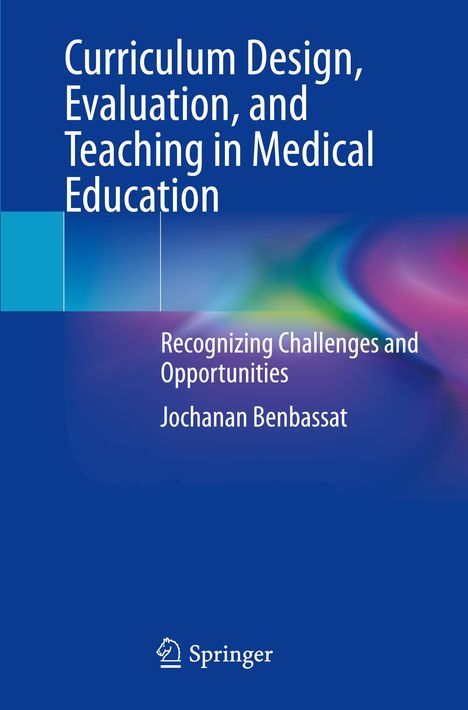Jochanan Benbassat: Curriculum Design, Evaluation, and Teaching in Medical Education, Kartoniert / Broschiert
Curriculum Design, Evaluation, and Teaching in Medical Education
- Recognizing Challenges and Opportunities
(soweit verfügbar beim Lieferanten)
- Verlag:
- Springer, 12/2024
- Einband:
- Kartoniert / Broschiert
- Sprache:
- Englisch
- ISBN-13:
- 9783031768446
- Artikelnummer:
- 12130698
- Umfang:
- 136 Seiten
- Gewicht:
- 243 g
- Maße:
- 235 x 155 mm
- Stärke:
- 8 mm
- Erscheinungstermin:
- 7.12.2024
- Hinweis
-
Achtung: Artikel ist nicht in deutscher Sprache!
Klappentext
This concise and challenging examination of medical education aims to discuss curriculum design and evaluation in medical schools and to take a fresh look at current trends in patient care and continuing education teaching methods. The ideas and insights provided here are based on the author's long career in clinical practice and teaching medical students and residents.
Medical education is no exception to the changes at every level in medicine. For example, the ready access to medical information via the Internet and other media has produced smarter and informed patients. Multi-specialty hospital practice has replaced the individual 'doctor-patient' relationship, perhaps compromising patient care to some extent. New subjects have been added over the years to medical curricula. Nevertheless, there has often been a reluctance to remove older topics, possibly limiting the medical training course's ability to develop as expected.
The transition from theories of higher education to the reality of curriculum planning and design is a huge leap. An important question is how to translate the mission of higher education in general which has been variably described as a training of 'reflective individuals' who 'possess both culture and expertise' and can 'master any subject with facility' into a coherent teaching program. The mission of medical education includes the promotion of professionalism in learners by including courses in medical ethics that have become integral to medical education in the USA. However, despite the development of standards and competencies related to professionalism, there is no consensus on the specific goals of medical ethics education, the knowledge and skills expected of learners, and the best pedagogical methods and processes for their implementation and assessment.
A significant contribution to the clinical teaching literature, Curriculum Design, Evaluation, and Teaching in Medical Education should be of interest to a variety of readers, including clinical educators, administrators, health care professionals, and especially residency directors.


